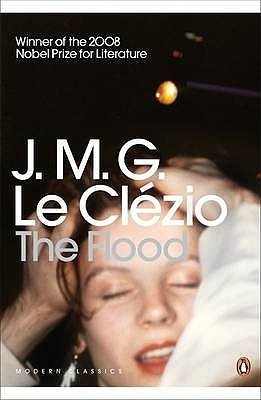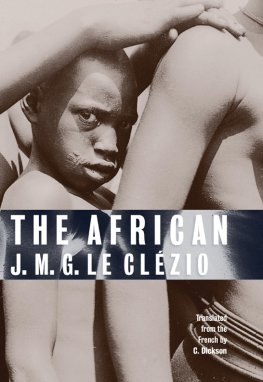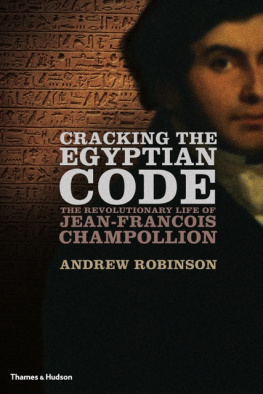Jean-Marie Le Clézio - The Flood
Here you can read online Jean-Marie Le Clézio - The Flood full text of the book (entire story) in english for free. Download pdf and epub, get meaning, cover and reviews about this ebook. year: 2008, publisher: Penguin Classics, genre: Prose. Description of the work, (preface) as well as reviews are available. Best literature library LitArk.com created for fans of good reading and offers a wide selection of genres:
Romance novel
Science fiction
Adventure
Detective
Science
History
Home and family
Prose
Art
Politics
Computer
Non-fiction
Religion
Business
Children
Humor
Choose a favorite category and find really read worthwhile books. Enjoy immersion in the world of imagination, feel the emotions of the characters or learn something new for yourself, make an fascinating discovery.
- Book:The Flood
- Author:
- Publisher:Penguin Classics
- Genre:
- Year:2008
- Rating:5 / 5
- Favourites:Add to favourites
- Your mark:
- 100
- 1
- 2
- 3
- 4
- 5
The Flood: summary, description and annotation
We offer to read an annotation, description, summary or preface (depends on what the author of the book "The Flood" wrote himself). If you haven't found the necessary information about the book — write in the comments, we will try to find it.
The Flood — read online for free the complete book (whole text) full work
Below is the text of the book, divided by pages. System saving the place of the last page read, allows you to conveniently read the book "The Flood" online for free, without having to search again every time where you left off. Put a bookmark, and you can go to the page where you finished reading at any time.
Font size:
Interval:
Bookmark:
Jean-Marie Le Clzio
The Flood
~ ~ ~
AT the beginning there were clouds, and more clouds, heavy, black, blown by intermittent gusts of wind, contained within a ring of mountains on the horizon. Everything began to grow dark, objects took on a regular pattern, lapped scales like thin blades of steel, or chain-mail, that frittered away what little brightness still remained. Other objects, themselves sources of light, began to flicker feebly and unhappily, overwhelmed by the vast proportions of some ill-defined yet imminent happening, made ridiculous by the mere fact of comparison to this enemy (as it were) against whom they had to sally forth and do battle. The movement gradually faltered, not through any loss of intensity or change in approach, but because its impetus was exhausted by the effort to hold up the advance of this freezing universal oblivion its very stillness imbued with a quality of eternity now creeping on, and on, biting into the earth, swallowing it inch by inch, infiltrating any manifestation of activity, breaking up the established harmonies of contrast, penetrating to the core of all matter, annihilating the very origins of life itself. Delicate and paper-light, the texture of darkness lay upon every surface, creating a multiplicity of silhouettes, and enhancing the intensity of such brightness as there was to a quite remarkable degree, so that a single point of light, reflected from the broken glass lying along the sidewalk, where the water-truck had crushed it, blazed out for something like a hundred light-years over an area bordering on infinity, and with the fierceness of three or more suns.
Any part of the view as it might be four hundred square yards of concreted surface, occupied by buildings made with cement and steel girders now seemed a kind of weird glacial desert a desert set down on top of the living soil, a tidy, planned desert, at once accommodating and abrasive, and self-contained, that is, equipped with an absolute, all-inclusive scheme of things, in which movement of bicycle + wilderness of streets echoing womens footsteps + trickle of water seeping along a crack in the macadam + railings in sharp perspective + an almost complete absence of loud, shattering noises + fourteen storeys + cold air in frozen blocks like slabs of marble and a flurry of artificial rain smelling of polythene indicated the exact steps that had to be taken, plotted the rules of the inhuman game.
The various elements all sorted and classified in their card-index universe rearranged themselves in accordance with this new factor (time of day, atmospheric pressure, degree of humidity and temperature) and quickly produced a terrible, diabolical image, which allowed for every move being played several times over, an infinite number of times. A childrens maze, in which all the paths converged on the same spot, opposite the site of the buried treasure, where pirate and crocodile lay in wait together. A strange world, hard and infallible, in which not the tiniest rivulet flowed at random, not a single flower protruded through the protective asphalt, not a tree lived, not a door was opened, not one cigarette fell and was stubbed out, unless it was so willed by that vast, solitary, nameless demiurge who parcelled out all things in the world, set his mark upon them, and bound them into the structure of his formal pattern.
A world in which all objects, every atom could be expressed by the letter A, and every happening and construct, of whatever sort, traced out the formula of the magic square:
A A A A
A A A A
A A A A
A A A A
that is to say, in which they kept up a constant process of simplification and purification, until the moment (impossible to describe it) was reached at which event and object, chain and link, were merged in a single phenomenon, A. The moped moved along the section of street between corner X and street-lamp Y, with a fading sound and reflected light glinting out from its hubs. But the moped as such was limited to this particular stretch of street, to the sound it made, to a glitter of light. In a moment its motion would be arrested, perhaps for a thousand years, or alternatively it might repeat, again and again, that quick, rhythmic passage from corner X to street-lamp Y, till the movement itself became the expression of its being. The rain would always go on falling here, the sidewalk would stretch away to the right for all eternity, yet both would be something different, rain and sidewalk no longer; there would be no more moped, no more corner, no more street-lamps, either lit or unlit, no more peeling walls, no more sounds of chains or wet tyres, no more bleak, chilly smells or dew-heavy smoke-drift hanging in mid-air; instead there would be a small, peaceful, undisturbed picture, a still-frozen image, dead before it had a chance to achieve immortality, part of a game which was no longer understood. Like pictures with such titles as View of Port-Louis and the Pic des Tois-Mamelles, or The Crossing of the Beresina, or Engraving of the Thames and the Houses of Parliament, and so on. Everything would come to this in the end. Meanwhile the water went on trickling down the gutters, and a whole host of small objects floated this way and that in the puddles along the road. It was the beginning.
Yet this was without importance, because from the moment the game began, the world had ceased to be and to have been. There was a certain number a little above the predictable average of ideal curves and perfect angles. These were the last to fall, since they embodied, over and above such things as Imbert and Phelippeau Building and Rue Paganini and War Memorial and Atlantis Cinema, various intellectual concepts not to mention a number of vague and ill-defined smells, such as those of smoke, or earth, or cooking soup, or even smells tout court, adaptable to hundreds of different requirements. In the same way colours, though tagged with a name three-quarters of the time, could conjure up an illusive sense of abstraction. Reds, whites, browns, greens, blues it was often because of them that the landscape began to split and crack apart.
A patch of white, for instance, might constitute the initial fissure; then, as on a sheet of glass or a frozen lake, other fissure-lines would radiate out around this central crack. Starting from the point of white, the break-up would spread and deepen visibly, gradually disintegrating both the object and its context. The sequence produced: white round pale light3 m. 12 cm. humming and flickering heat steel, bronze, smelting verticality.
Gently the fissure would expand and encroach, so that, viewed in perspective, one object could break up another by a simple process of superimposition. Similar movements were being set up at countless different points, and the mere prolongation of two straight lines, in accordance with roughly geometrical principles, was enough to do the trick. Each fresh viewpoint increased the fragmentation of matter, so that it became an easy matter to achieve the demolition of a twelve-storey apartment block, with 198 windows, in less than sixty seconds. A series of these windows (the light glinting off them took on a violet tinge) would initiate the movement and then repeat it inexhaustibly, so that the ascending progression became generalized upward motion. This spatial development was accompanied by a parallel phenomenon in the time-factor: the extremities of time were looped together, duration bent into a circle, beginning and end merged together, establishing the perfect sphere. Just as the first and the twelfth window were no longer distinguishable, but both subsumed to the same idealized movement of ceasing-to-be and coming-into-being, so the first and the twenty-fourth hour, the first and the sixtieth second, shaken together by the uncertain rhythm of a no longer forward-moving time-sequence, would come and go, achieve and conclude their existence millions of times over, preserved from any progression by some dark hour, by a particular negative second, the retroactive impulse of which predictable and inevitable as the next tick of a metronome exemplified a species of mechanical perfection.
Font size:
Interval:
Bookmark:
Similar books «The Flood»
Look at similar books to The Flood. We have selected literature similar in name and meaning in the hope of providing readers with more options to find new, interesting, not yet read works.
Discussion, reviews of the book The Flood and just readers' own opinions. Leave your comments, write what you think about the work, its meaning or the main characters. Specify what exactly you liked and what you didn't like, and why you think so.







![St. Jean-Marie Baptiste Vianney - The Little Catechism of the Cure of Ars (with Supplemental Reading: Confession: Its Fruitful Practice) [Illustrated]](/uploads/posts/book/270052/thumbs/st-jean-marie-baptiste-vianney-the-little.jpg)



